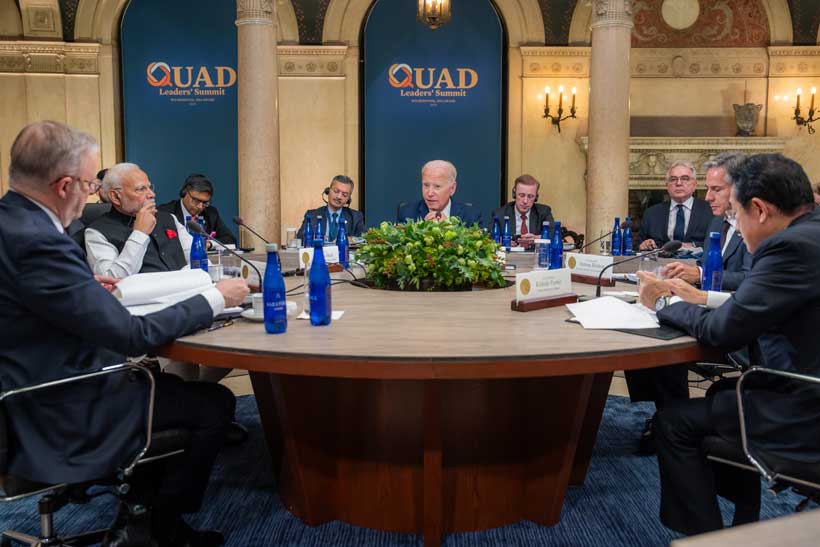American President Joe Biden hosted the 4th chair of QUAD in his hometown of Wilmington, Delaware. At this summit, the QUAD members emphasized a free and open Indo-Pacific for all. In retrospect, the former Japanese PM Shinzo Abe was the first to initiate the formation of the QUAD in 2007 with other members Such as the US, India, and Australia. States shaped the alliance to protect the Indo-Pacific region and foster economic and security cooperation. The QUAD is deemed an “alliance of maritime democracies.” In the 4th Summit, Biden weighed in on India, an important QUAD partner.
It is pertinent to mention that along with the QUAD, India is also an integral member of another expanding alliance, the BRICS (Brazil, Russia, India, China, and South Africa), which is regarded as anti-US and seen as a potential threat to US economic dominance and de-dollarization of the world economy. India, once the champion of non-alignment, has shifted its stance from non-alignment to multi-alignment by reshaping its diplomatic engagement effectively.
Apparently, India has managed to keep its stronghold in both alliances, but the question arises: where does India stand in the quarrel of the anti-US alliance—BRICS and the anti-China bloc—QUAD? Generalizing the purpose of both alliances, the former serves the interests of China against the US, and the latter serves the US interests against China, and the success of either alliance will end up in the fall of the other. Many scholars are of the opinion that BRICS will shape a new world order and one of its members can replace the US to lead the global politics, and China seems to be the frontrunner for the next hegemon and successor of the US due to its growing economic strength and successful diplomatic reach in every region of the world. However, the success of China will ultimately be thwarted through the QUAD and other security alliances in the Asia-Pacific.
QUAD serves strategic, economic, welfare, and a range of interests for its members, but security seems to be a prior and collective interest for all its members against China. Especially the border clashes between India and China, which disturbed the diplomatic relations between Beijing and New Delhi. India sought strategic ground to maintain the status quo in the Indo-Pacific and balance of power in the region against China, which apparently protects the security interests of India, and the QUAD seems to be the right alliance to achieve the desired interests, but the BRICS, on the other side, has contrary objectives and ambitions of economic integration of member countries.
India’s approach to balance between Washington and Beijing has raised questions: is it a policy of multi-alignment or strategic ambiguity of New Delhi? Because on practical grounds both the alliances have their distinct principles, plans, and pursuits; every member of the QUAD and the BRICS has joined the alliance with the imperatives of their national interests, and New Delhi is the only common member in both groups. Indian ambitions are tough nut to crack due to its ambiguous behavior while dealing with both alliances. Will India foil the US and the QUAD to defend its ties with the BRICS being well aware of China, the traditional rival of India and the largest economy among all BRICS members and considered to be the leading partner, or will it stand by the QUAD for its strategic objectives against China in any possible circumstances has yet to be seen.
Recently, Iran, the UAE, Egypt, and Ethiopia joined BRICS in January 2024, which validates the enlarging dominion of BRICS and its performance. It is not just a membership, but the trust and confidence among states and diplomatic success of the BRICS. Where the QUAD stands on 4 members since its birth, which questions its ambitions in the region, and there is no doubt that the QUAD is more concerned about the strategic and security objectives of the US against China, which creates a dilemma for the member states.
India may benefit from the success of either coalition, but the Indian ambiguity will not favor the region or other alliance due to its mysterious position between the US and China and dual membership. There is complete ambiguity and obscurity in the Indian course of action. India has to choose between neighbors and partners, taking into consideration the growing influence of the QUAD in the so-called Indo-Pacific can develop a NATO version of an alliance in the region, and the Russia-Ukraine war has proved the consequences.
